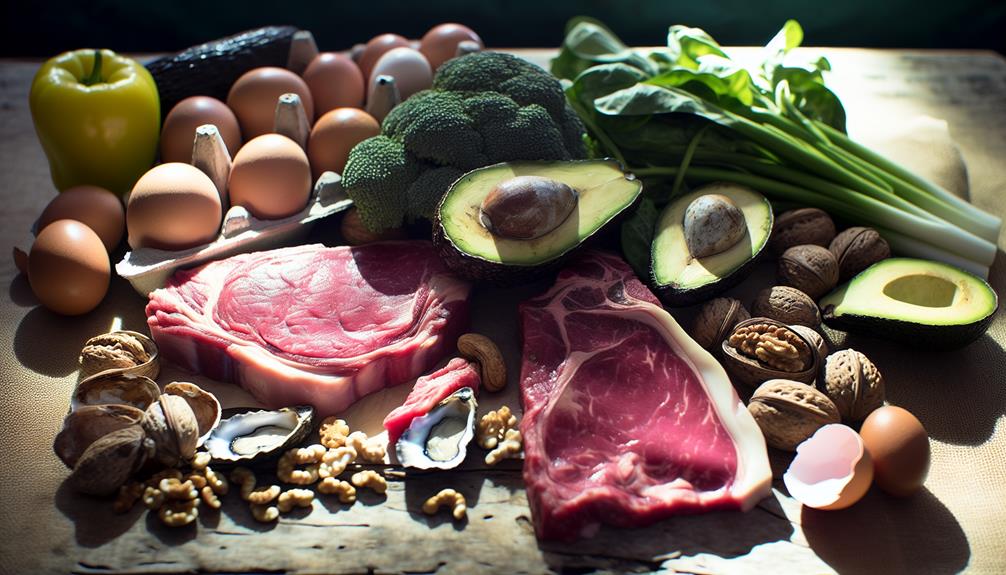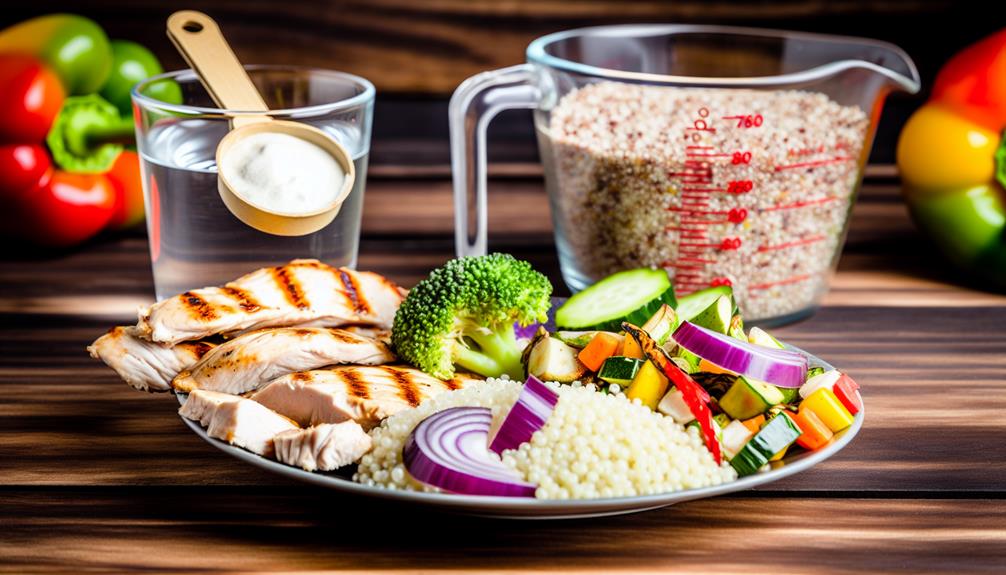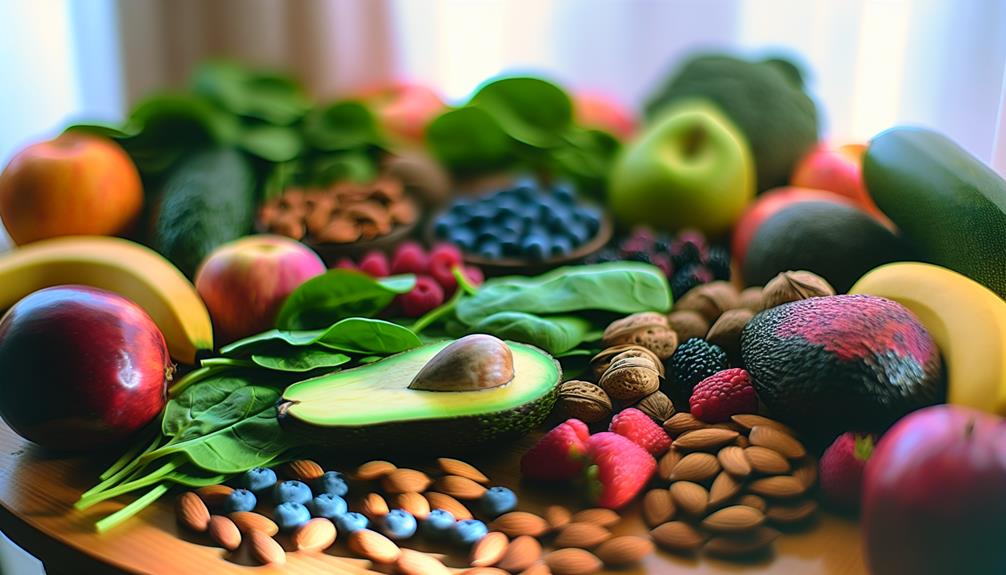I find that diet greatly impacts hormonal health for men over 50. As we age, hormonal changes like reduced testosterone and impaired insulin sensitivity can arise. Incorporating nutrient-dense foods—like zinc-rich oysters, healthy fats from avocados, and high-fiber whole grains—can support hormone balance. It's equally important to avoid processed sugars and trans fats that disrupt this balance. Staying hydrated and implementing meal timing strategies also help maintain steady energy levels and hormone regulation. By making thoughtful dietary choices, I can promote better health, and there's much more to explore about optimizing my hormonal well-being.
Understanding Hormonal Changes

As we age, we can't help but notice the subtle shifts in our bodies, particularly when it comes to hormonal levels. For men over 50, understanding these changes is important for maintaining overall health. Hormonal imbalance can arise due to age-related changes in our endocrine system, affecting our metabolic processes and body composition.
One significant factor in managing hormonal health is our dietary patterns. Poor nutrition can lead to nutritional deficiencies, which may exacerbate hormonal issues. I've learned that incorporating a balanced diet rich in whole foods can support hormonal signaling, promoting better health outcomes. It's not just about what we eat, but how we manage stress, too. Stress management plays an essential role in hormonal balance, as chronic stress can disrupt hormone levels and lead to further imbalances.
Lifestyle modifications, such as regular exercise and adequate sleep, are also important. These habits can help stabilize hormones and improve body composition, contributing to overall well-being. By prioritizing these aspects, we can mitigate some of the effects of hormonal changes and maintain a healthier, more vibrant life.
Key Hormones Affected by Diet
Hormonal health is greatly influenced by what we eat, particularly for men over 50. I've found that understanding the key hormones affected by diet can truly empower us to make informed choices. For instance, maintaining insulin sensitivity is essential. Consuming a balanced diet rich in whole foods, fiber, and healthy fats can help regulate blood sugar levels, ultimately supporting metabolic health.
Cortisol, the stress hormone, is another important player. Managing our intake of refined sugars and processed foods can aid in better cortisol regulation. Additionally, thyroid function is crucial for energy levels and metabolism; therefore, ensuring adequate iodine and selenium through foods like fish and nuts can make a difference.
Leptin and ghrelin are hormones that govern hunger and satiety. Eating regular, nutrient-dense meals can help maintain healthy leptin levels while promoting ghrelin balance, reducing cravings and aiding weight management. It's also essential to reflect on estrogen influence in our bodies. While we typically associate estrogen with women, men also produce it, and a diet low in processed foods can help keep estrogen levels in check.
Moreover, testosterone modulation is considerably impacted by what we consume. Healthy fats, like those found in avocados and olive oil, can support testosterone production. Finally, practicing nutrient timing—consuming the right nutrients around workouts—can enhance digestive health and overall well-being. By focusing on these hormones, we can take proactive steps toward better hormonal health as we age.
Impact of Aging on Hormones

Aging naturally leads to a gradual decline in hormone levels, which can greatly affect overall health and well-being. For men over 50, this hormonal decline often manifests as reduced testosterone production. This decline doesn't just impact libido; it can also lead to decreased muscle mass and increased body fat. Age-related changes can also disrupt estrogen balance, which is essential even for men, as it plays a role in bone health and mood regulation.
Additionally, metabolic slowdown is a common concern. As our hormones shift, our bodies may struggle with insulin sensitivity, making weight management more challenging. This metabolic shift can contribute to a cycle where weight gain further exacerbates hormonal imbalances, leading to fertility issues that many may not expect at this stage of life.
Stress response becomes another important factor. With aging, some men experience adrenal fatigue, which can weaken the body's ability to cope with stress. This fatigue can hinder thyroid function, further complicating weight management and energy levels. Thyroid hormones are fundamental for regulating metabolism, and their decline can greatly impact overall vitality.
Recognizing these changes is necessary for addressing them proactively. By understanding the impact of aging on hormones, we can make informed choices to support our hormonal health and mitigate the effects of these natural processes. Staying proactive with lifestyle adjustments can help manage these age-related changes effectively.
Essential Nutrients for Hormonal Health
When it comes to maintaining hormonal health as we age, I've found that focusing on essential nutrients is fundamental. Key vitamins and minerals, healthy fats, and balanced protein sources all play significant roles in our body's hormonal functions. Let's explore how these nutrients can support our well-being and liveliness.
Key Vitamins and Minerals
Nutritional needs change as we age, and I often find that key vitamins and minerals play an essential role in supporting hormonal health for men over 50. For instance, vitamin D and zinc are vital for testosterone production. I recommend getting these from vitamin sources like fatty fish and fortified foods.
Additionally, mineral absorption can be enhanced through specific food combinations. Pairing vitamin C-rich foods with iron sources can notably improve absorption. I also suggest reflecting on dietary supplements if you're unable to meet your needs through diet alone, especially in the winter months when seasonal foods may be less available.
Another aspect to examine is nutrient timing; consuming antioxidant-rich foods like berries can help reduce oxidative stress, which impacts hormone levels. Incorporating fermented foods can boost gut health, further assisting in nutrient absorption.
Lastly, plant-based nutrients, such as those found in leafy greens and legumes, can contribute to overall hormonal balance. By focusing on these key vitamins and minerals, I believe we can optimize our hormonal health and improve our well-being as we age.
Healthy Fats Importance
Incorporating healthy fats into your diet is essential for maintaining hormonal balance as you age. As men over 50, our bodies require certain nutrients to support testosterone production and overall hormonal health. Healthy fat sources, such as avocados, nuts, seeds, and olive oil, not only provide energy but also play a key role in hormone synthesis.
These fats are critical for fat digestion, which allows our bodies to absorb fat-soluble vitamins like A, D, E, and K. Including these healthy fats can improve your heart health, reduce inflammation, and support brain function—benefits that are particularly important as we grow older.
Research shows that diets rich in healthy fats can help maintain ideal testosterone levels, which can decline with age. So, when planning your meals, focus on incorporating a variety of these healthy fat sources.
For instance, try adding a handful of walnuts to your morning oatmeal or drizzling olive oil on your salads. By making these small changes, you'll be taking significant steps toward enhancing your hormonal health and overall well-being. Remember, the right fats can make a world of difference in how you feel and function as you age.
Protein Sources and Balance
Protein plays an essential role in maintaining hormonal health, especially for men over 50. As we age, our bodies require a balanced intake of high-quality protein to support muscle mass, repair tissues, and regulate hormones. I've found that incorporating a variety of protein sources is vital. Lean meats, such as chicken and fish, are excellent choices due to their high protein quality and amino acid profiles.
Don't overlook plant proteins either; beans, lentils, and quinoa provide essential nutrients while promoting protein diversity. Dairy options, like Greek yogurt and cottage cheese, not only deliver protein but also support digestion with probiotics.
Timing your protein intake is equally important. I aim to spread my protein consumption throughout the day to enhance protein digestion and maximize muscle synthesis. If my dietary choices fall short, I consider protein supplements as a convenient way to meet my needs.
Ultimately, focusing on a balanced approach that includes various protein sources guarantees I get the amino acids necessary for hormonal health. By prioritizing protein quality and intake, I'm actively supporting my overall well-being as I age.
Foods That Boost Testosterone

Testosterone plays an essential role in men's health, especially as we age, and certain foods can give it a natural boost. Incorporating specific nutrients into your diet can positively impact testosterone levels. For instance, zinc-rich foods are vital since zinc deficiency has been linked to low testosterone. Foods like oysters, pumpkin seeds, and beans can be great additions.
In addition to zinc, I've found that consuming healthy protein sources, such as lean meats and legumes, supports hormone production. Don't overlook the power of testosterone boosting herbs like fenugreek and ashwagandha, which can enhance your testosterone levels naturally. If you're looking for something quick, testosterone boosting smoothies made with spinach, berries, and protein powder can be an easy option.
Here's a table that summarizes some effective foods for boosting testosterone:
| Food Category | Examples |
|---|---|
| Zinc Rich Foods | Oysters, Pumpkin Seeds, Beans |
| Healthy Protein Sources | Chicken, Lentils, Tofu |
| Testosterone Boosting Herbs | Fenugreek, Ashwagandha |
| Stress Reducing Foods | Dark Chocolate, Green Tea |
Implementing lifestyle changes can noticeably impact your testosterone levels. Pairing nutrient timing strategies with testosterone boosting exercises, like weight lifting, can be particularly effective. Additionally, including fermented foods can offer benefits for gut health, which may indirectly support hormonal balance. By focusing on these foods, I've noticed a difference in my overall well-being and energy levels.
Role of Healthy Fats
When it comes to maintaining hormonal health, healthy fats play an important role, especially for men over 50. I've found that essential fatty acids, like omega-3s, can positively impact testosterone levels, which is essential as we age. Incorporating sources of healthy fats into your diet can not only support hormone balance but also enhance overall well-being.
Essential Fatty Acids
Healthy fats, particularly essential fatty acids (EFAs), play a fundamental role in hormonal health for men over 50. These fats are imperative for maintaining hormonal balance, and their benefits extend beyond that. Omega-3 sources, such as fatty fish, flaxseeds, and walnuts, are excellent dietary options. Incorporating these into my meals can promote heart health and enhance brain function, which is particularly valuable as I age.
The anti-inflammatory properties of omega-3 fatty acids can help reduce chronic inflammation, a common concern for men over 50. When I consider cooking methods, I prefer baking or grilling to frying, retaining the beneficial properties while minimizing unhealthy fats. It's also essential to maintain a balanced ratio of omega-3 to omega-6 fatty acids, as too much of the latter can lead to inflammation and hormonal imbalances.
If I find it challenging to get enough EFAs from my diet, I explore supplementation options, like fish oil or algal oil capsules. By prioritizing these essential fatty acids, I not only support my hormonal health but also my overall well-being. Making these dietary changes can greatly enhance my quality of life as I navigate this stage of life.
Impact on Testosterone Levels
Maintaining ideal testosterone levels is essential for men over 50, and the role of healthy fats in this process cannot be overstated. I've learned that incorporating the right fats into my diet can serve as natural testosterone boosters, which is critical for hormonal health.
Here are some practical diet strategies I've found effective:
- Avocados: Rich in monounsaturated fats, they support testosterone production.
- Nuts and Seeds: Almonds and pumpkin seeds are excellent sources of zinc, important for testosterone synthesis.
- Fatty Fish: Salmon and mackerel provide omega-3 fatty acids, which help regulate hormones.
- Olive Oil: This heart-healthy oil can enhance testosterone levels while reducing inflammation.
- Coconut Oil: It may boost testosterone production and provide energy.
Importance of Protein Intake

Many men over 50 may not realize just how vital protein intake is for their overall health and hormonal balance. As we age, maintaining muscle mass becomes critical, and that's where protein plays a pivotal role. It's not just about how much protein we consume; it's also about protein quality. High-quality protein sources, like lean meats, fish, eggs, and legumes, provide the essential amino acids our bodies need for ideal protein synthesis.
Timing our protein intake can also make a difference. Distributing protein consumption evenly throughout the day—ideally every three to four hours—can enhance muscle protein synthesis and improve recovery. This is especially important if we're engaging in regular physical activity.
Protein deficiency can lead to a host of issues, including muscle loss, weakened immunity, and hormonal imbalances. If we don't get enough protein, our bodies may struggle with protein digestion, further exacerbating these problems. As a result, I recommend being mindful of our protein sources and ensuring we're meeting our daily needs.
Incorporating a variety of protein-rich foods into our diets not only supports muscle health but also helps regulate hormones like testosterone, which is essential for men over 50. So, let's prioritize our protein intake and consider how it impacts our overall well-being. Remember, it's not just quantity; it's about quality and timing too!
Carbohydrates and Hormonal Balance
While it might seem like carbohydrates are the enemy in the quest for hormonal balance, they actually play a crucial role in our overall health, especially for men over 50. Understanding carbohydrate types can help us make informed choices that support our metabolic health.
Focusing on the glycemic index helps us choose the right carbs. Low-GI foods lead to a slower insulin response, keeping our energy levels stable. Here are some practical tips for managing carbohydrates effectively:
- Prioritize whole grains: Foods like quinoa, brown rice, and oats provide essential nutrients and fiber sources that promote digestive health.
- Be cautious with refined sugars: Cutting back on sugary snacks and beverages can help prevent insulin spikes that disrupt hormonal balance.
- Consider carbohydrate timing: Eating carbs around workout times can enhance energy levels and aid recovery.
- Experiment with carbohydrate cycling: This approach can help optimize fat loss while maintaining muscle mass.
- Incorporate fiber sources: High-fiber foods, such as legumes and vegetables, not only support digestion but also help regulate blood sugar levels.
Micronutrients for Optimal Hormones

When it comes to optimizing hormonal health, essential vitamins and minerals play an important role that I can't overlook. Nutrients like vitamin D, zinc, and magnesium can greatly impact hormone production and regulation. Additionally, incorporating antioxidants into my diet helps combat oxidative stress, which is essential for maintaining hormonal balance as we age.
Essential Vitamins and Minerals
As we age, ensuring our diet is rich in essential vitamins and minerals becomes important for maintaining hormonal balance. Nutrient absorption can decline with age, making it essential to focus on dietary sources that deliver these micronutrients effectively. I've found that certain vitamins and minerals play significant roles in supporting hormonal health for men over 50. Here are some key nutrients to keep in mind:
- Vitamin D: Supports testosterone levels and bone health; can be found in fatty fish and fortified dairy.
- Zinc: Necessary for testosterone production; rich sources include oysters, beef, and pumpkin seeds.
- Magnesium: Helps regulate cortisol and insulin; found in nuts, seeds, and leafy greens.
- Vitamin B6: Aids in hormone regulation; present in chicken, fish, and potatoes.
- Omega-3 Fatty Acids: Significant for reducing inflammation and supporting overall hormonal balance; found in fish oil and flaxseeds.
Impact of Antioxidants
In addition to vitamins and minerals, antioxidants play an essential role in maintaining hormonal health, especially for men over 50. I've found that incorporating antioxidant-rich foods into my diet has made a noticeable difference in my overall well-being. Antioxidants help combat oxidative stress, which can disrupt hormone production and balance.
Some great antioxidant sources include berries, dark chocolate, nuts, and leafy greens. These foods are not just delicious but also packed with compounds that protect our cells from damage. For instance, vitamin C and E are well-known antioxidants that support adrenal function and testosterone production.
The antioxidant benefits are significant. They can enhance mood, improve energy levels, and even support healthy libido. Research suggests that a diet rich in antioxidants may help lower inflammation, which is another key factor in maintaining hormonal balance as we age.
Hydration and Hormonal Function
Hydration plays an essential role in maintaining hormonal balance, especially for men over 50. As we age, our bodies may struggle with fluid balance, leading to various health issues that can affect our hormonal function. Staying properly hydrated is vital for optimizing our well-being and ensuring our hormones remain in check. Here are some hydration benefits that I've found particularly relevant:
- Improved energy levels: Proper hydration helps sustain my energy and reduces feelings of fatigue.
- Enhanced mood stability: Staying hydrated positively influences my mood and reduces irritability.
- Optimal metabolic function: Adequate fluid intake supports metabolism, aiding in weight management.
- Joint health maintenance: Hydration helps lubricate joints, reducing discomfort during physical activity.
- Regulated body temperature: Hydration plays a key role in thermoregulation, keeping me comfortable and active.
As a man over 50, I've realized that neglecting hydration can lead to hormonal imbalances, which may exacerbate issues like low testosterone or increased cortisol levels. Drinking enough water throughout the day isn't just about quenching thirst; it's about supporting our body's intricate hormonal systems.
To maintain fluid balance, I aim for at least eight 8-ounce glasses of water daily, adjusting based on my activity level and climate. Incorporating hydrating foods like fruits and vegetables also contributes to my overall fluid intake. By prioritizing hydration, I'm taking a proactive step toward preserving my hormonal health and enhancing my quality of life.
Foods to Avoid

Many men over 50 might not realize how certain foods can negatively impact hormonal health. As I've learned, avoiding specific food groups can be essential for maintaining balance in our hormones. For starters, processed sugars are notorious for causing insulin spikes, which can disrupt hormonal balance. I've noticed that cutting back on sweets has made a difference in how I feel.
Trans fats, found in many fried foods and baked goods, can also wreak havoc on our hormonal systems. These unhealthy fats may increase inflammation and lower testosterone levels, so I've made a conscious effort to steer clear of them. Excessive alcohol is another culprit; it can lead to liver damage, which affects hormone regulation.
Refined carbohydrates, like white bread and sugary cereals, can lead to weight gain and insulin resistance, so I try to limit those as well. High sodium foods not only raise blood pressure but can also trigger hormonal imbalances. I'm more mindful of my salt intake, especially in processed foods.
Artificial sweeteners may seem like a healthier choice, but they can confuse our body's natural hunger signals. Dairy products and soy products may contain hormones that interfere with our own, so I've reduced my consumption of these.
Lastly, red meat, especially when consumed in excess, can lead to higher levels of saturated fats, which might negatively affect testosterone levels. By avoiding these foods, I feel more in control of my hormonal health and overall well-being.
The Role of Fiber
Fiber plays an essential role in maintaining hormonal health, especially for men over 50. As we age, our bodies undergo various changes that can impact hormone levels, and a diet rich in fiber can help mitigate these effects. Not only does fiber support digestive health, but it also helps regulate hormones by influencing insulin sensitivity and cholesterol levels.
Incorporating adequate fiber sources into your daily diet can provide numerous benefits:
- Improved digestion: Fiber aids in regular bowel movements, preventing constipation.
- Weight management: High-fiber foods tend to be more filling, which can help control appetite and maintain a healthy weight.
- Hormonal balance: Soluble fiber can help lower cholesterol, reducing the risk of hormonal imbalances linked to cardiovascular health.
- Blood sugar control: Fiber slows down sugar absorption, helping to stabilize blood glucose levels and reduce insulin spikes.
- Gut health: A diet rich in fiber promotes a healthy gut microbiome, which is vital for hormone production and regulation.
I've found that integrating various fiber sources, like whole grains, fruits, vegetables, legumes, and nuts, makes it easier to meet daily requirements. Aim for at least 25-30 grams of fiber each day. By focusing on these fiber-rich foods, I'm not only enhancing my digestive health but also supporting my overall hormonal balance. So, if you haven't already, consider making fiber a priority in your meals. Your body will thank you!
Meal Timing and Frequency

While it's easy to overlook the timing and frequency of meals in our busy lives, I've found that these factors can substantially impact hormonal health, especially for men over 50. Research suggests that meal frequency plays a crucial role in regulating hormones like insulin and testosterone. By aligning our eating patterns with our body's natural circadian rhythms, we can optimize hormonal balance.
One approach I've explored is intermittent fasting. This method not only allows for fewer meals but also helps in regulating insulin sensitivity, which is essential as we age. By compressing our eating window—say, from noon to 8 p.m.—I've noticed improvements in energy levels and overall health.
Nutrient timing is another important aspect to take into account. It's not just about when we eat but also what we eat. Focusing on high-quality meal composition, rich in proteins and healthy fats, can maximize hormonal responses. For instance, having a protein-rich meal shortly after a workout can enhance muscle recovery and stimulate testosterone production.
Moreover, I've come to appreciate the significance of consistent eating patterns. Irregular meal timing can lead to hormonal fluctuations that may affect mood and energy. By sticking to a routine, I find that my body functions more efficiently.
Lifestyle Factors Beyond Diet
When I think about maintaining hormonal health as I age, I realize that exercise and sleep quality are just as vital as diet. Regular physical activity not only helps in regulating hormone levels but also boosts mood and energy. Additionally, prioritizing good sleep can greatly impact my overall hormonal balance, making it essential to take into account these lifestyle factors.
Exercise and Hormonal Balance
Regular exercise plays an important role in maintaining hormonal balance, especially for men over 50. As I've learned, incorporating various exercise types can greatly enhance hormone regulation and overall health. Here's what I've found to be essential for achieving fitness goals and ideal body composition:
- Weight Training: It boosts testosterone levels and helps maintain muscle mass.
- Cardio Benefits: Activities like walking or cycling improve metabolic health and reduce stress.
- Flexibility Training: Stretching enhances mobility and aids in recovery methods, minimizing injury risk.
- Stress Management: Regular exercise reduces cortisol levels, which can disrupt hormonal balance.
- Recovery Methods: Adequate rest and active recovery are critical in preventing overtraining and ensuring hormonal stability.
Sleep Quality Impact
Sleep quality greatly impacts hormonal health, particularly for men over 50. I've learned that maintaining good sleep hygiene is fundamental for optimizing hormone levels, especially testosterone. Disruptions in circadian rhythms can lead to decreased melatonin production, which plays a critical role in regulating sleep. To guarantee better sleep, I focus on creating a conducive sleep environment, free from noise and light, where I can unwind.
Establishing a consistent bedtime routine helps signal my body that it's time to relax. Incorporating relaxation techniques, such as deep breathing and light stretching, has markedly improved my ability to fall asleep. Managing stress is also essential; high stress levels can lead to sleep disorders that further disturb hormonal balance.
Sometimes, I consider sleep supplements, like melatonin, to help kick-start my sleep cycle, but I always consult a healthcare professional first. Environmental factors like room temperature and mattress comfort can't be overlooked either. By prioritizing sleep, I've noticed a positive impact on my overall well-being and hormonal health. Making these adjustments can be a game-changer for men over 50 looking to maintain their vitality and hormonal balance.
Frequently Asked Questions
How Can Stress Affect Hormonal Health in Men Over 50?
I've learned that stress can considerably impact hormonal health, particularly through elevated cortisol levels. High cortisol can lead to weight gain, reduced muscle mass, and fatigue. To manage stress effectively, I focus on techniques like mindfulness and regular exercise, which help lower cortisol and promote overall well-being. It's essential to recognize the signs of stress and actively seek stress management strategies to maintain a balanced hormonal profile as we age.
What Are Signs of Hormonal Imbalance in Older Men?
You might think hormonal imbalances are only for women, but that's not true. In older men, signs of imbalance can include fatigue, mood swings, and reduced libido. It's essential to identify these symptoms early. Lifestyle factors like diet and exercise can play a significant role in how I feel. Paying attention to these signs and making necessary adjustments can lead to better overall health and well-being. Don't ignore what your body's telling you!
Can Supplements Improve Hormonal Health for Men Over 50?
I've often wondered if supplements can truly improve hormonal health. While some supplements might act as natural boosters, I've found that focusing on dietary sources is equally important. Foods rich in zinc, omega-3s, and healthy fats can support hormone production. It's wise to consult with a healthcare professional before starting any supplements, as individual needs vary. So, I'd recommend combining both dietary changes and thoughtful supplementation for the best results.
How Often Should Men Over 50 Get Hormonal Health Check-Ups?
I believe men over 50 should get hormonal health check-ups at least once a year. These check-ups help monitor testosterone levels and identify any imbalances early on. If you're making dietary changes to support hormonal health, regular assessments can guide your progress and adjustments. It's essential to stay proactive about your health, as these check-ups can provide valuable insight into how well your body is responding to changes you're making.
Are There Specific Diets to Follow for Hormonal Balance After 50?
When it comes to achieving hormonal balance, I've found that a Mediterranean Diet works wonders. It emphasizes healthy fats, like olive oil, and protein sources such as fish and legumes. I also make sure my fiber intake is high, incorporating plenty of fruits and vegetables. Antioxidant foods, like berries, are essential too. Don't forget about meal timing; eating smaller, balanced meals throughout the day can really help maintain stable hormone levels.
